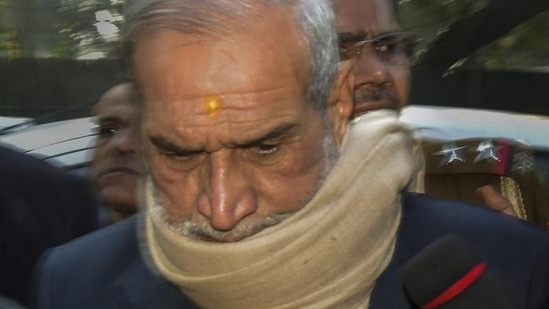The court on February 12 convicted Sajjan Kumar in a murder case in connection with 1984 anti-Sikh riots. Former Congress leader Sajjan Kumar was on Tuesday awarded life imprisonment by a special court for the murder of a father-son duo in Delhi’s Saraswsti Vihar during the 1984 anti-Sikh riots. The court on February 12 convicted Sajjan Kumar for the offence and sought a report from Tihar Central Jail authorities on his psychiatric and psychological evaluation in view of a Supreme Court order asking for such a report in cases attracting capital punishment.
The minimum punishment for murder is life imprisonment whereas the maximum is death.
Reacting to the verdict, Delhi Sikh Gurudwara Management Committee (DSGMC) general secretary Jagdip Singh Kahlon said they are not happy with the punishment awarded to Sajjan Kumar. “We are upset that someone like Sajjan Kumar was not given the death penalty. I believe if he had been given a death sentence, it would have been better, and we would have felt satisfied…After 41 years, even if he got life imprisonment, justice has prevailed. I respect the verdict of the court,” Khalon.
The 1984 anti-Sikh riots were triggered by the assassination of the then Prime Minister Indira Gandhi on October 31, 1984, by her Sikh bodyguards, Beant Singh and Satwant Singh. The assassination occurred in the wake of Operation Blue Star, a military operation that year in June, which was undertaken to remove Sikh militants, including Jarnail Singh Bhindranwale, who were holed up in the Golden Temple, a holy shrine for Sikhs in Punjab’s Amritsar. “The accused, as the leader of the mob, incited others to carry out genocide, crimes against humanity, and cold-blooded murders. He deserves nothing less than the death penalty,”the argument of senior advocate HS Phoolka, representing the complainant.
Jaswant Singh and his son Tarundeep Singh were killed on November 1, 1984.
HS Phoolka pointed out that Sajjan Kumar had already been convicted by the Delhi High Court for five murders in another case related to the riots in Delhi Cantonment’s Raj Nagar area, and that these murders, alongside the ones in the present case, were part of a broader genocide.



